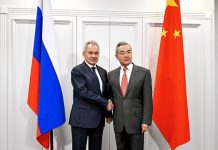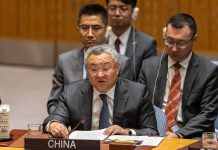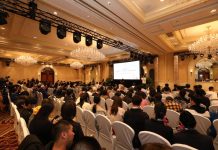
The Olympic Games are a rare occasion where representatives from the world’s nations come together to compete in sports. Despite the intense competition, the world’s largest sporting event promotes a spirit of peace and camaraderie. Individual athletes and national teams take great pride in displaying their talent, skill and dedication on the world stage.
However, the Olympics can also become a platform for political tensions.
The Paris 2024 Olympic Summer Games demonstrated this issue as some Western countries criticized China’s swimmers, invoking rhetorics reminiscent of Cold War-era politics.
Certain Western media outlets have leveled doping accusations against Chinese swimmers. This controversy gained attention in April, when U.S. newspaper The New York Times reported that 23 top Chinese swimmers tested positive for trimetazidine, a banned substance, in 2021. Despite this, they had been allowed to compete in the delayed Tokyo 2020 Olympic Summer Games that year.
What happened?
According to the report, the U.S. Anti-Doping Agency (USADA) accused the World Anti-Doping Agency (WADA) of “covering up” for China after it concluded that the positive tests in 2021 were the result of no-fault food contamination.
WADA responded to the allegations by conducting an independent investigation.
The investigator found that no interference from Chinese authorities or favoritism had occurred in WADA’s review. However, in May, the U.S. House Committee on China asked the Justice Department and the Federal Bureau of Investigation to investigate the case under a federal law, the Rodchenkov Anti-Doping Act, that allows probes into suspected doping charges even if they occurred outside the U.S.
In early July, just three weeks before the opening of the Paris Olympics on July 26, the international swimming federation World Aquatics told U.S. not-for-profit news agency Associated Press that its executive director Brent Nowicki had been subpoenaed to testify in the U.S. criminal investigation into the Chinese case.
In late July, The New York Times then published another report accusing two more Chinese swimmers of doping. The two in 2022 tested positive for metandienone, an anabolic steroid that carries one of the longest bans.
However, the China Anti-Doping Agency (CHINADA) cleared them, concluding that the positive results were due to contaminated food.
Still, the accusations have cast a shadow over WADA’s reputation and fueled skepticism in the West about China’s athletic achievements. This was especially evident in the reactions to swimmer Pan Zhanle’s record-breaking Paris performance in the men’s 100-meter freestyle and 4×100-meter medley relay, where he won China the gold medals. British swimmer and triple Olympic gold medalist Adam Peaty afterward commented to the media that “there’s no point in winning if you don’t win fair,” implying that Pan and the Chinese team were cheating. Australian swim coach Brett Hawke also remarked on social media that Pan’s achievements were “not humanly possible.”
For thee, not for me
These remarks are not about sports or fair competition at all. All of China’s swimmers were cleared by both WADA and CHINADA to participate in the Paris Olympics, and it is well-known that Chinese swimmers are among the most tested athletes in the world.
The politicization of China’s accomplishments in Paris is a byproduct of the U.S. Cold War mentality, which seeks to rally the West into a strategic confrontation with China.
The contradictions in this agenda were highlighted rather dramatically by a WADA report, as revealed by international news agency Reuters, indicating that numerous U.S. athletes were allowed to compete for years despite violating doping rules.
In exchange, these athletes acted as informants for USADA, providing information about other doping violators.
This practice was reportedly kept secret from WADA, and the news has led China to call for stronger testing measures for U.S. athletes. Furthermore, U.S. sprinter Erryion Knighton was allowed to compete in Paris 2024 despite testing positive for the banned steroid trenbolone, with USADA attributing the positive test to contaminated meat.
On the surface, U.S. actions demonstrate the classic expression, “rules for thee, but not for me.” Beneath the surface, however, hides the U.S. ultimate goal of maintaining its hegemony in all fields by hyping up the “China threat.”
While China participated in Paris 2024 as just another national competitor, the U.S. continued to fuel Cold War sentiment by portraying Chinese athletes as “cheaters.”
The bigger picture
This U.S. narrative builds upon years of efforts by Western mainstream media and U.S. elites to portray China negatively and drive public opinion about the country to historic lows.
In doing so, the U.S. has manufactured support for policies that extend far beyond the Olympics. These include the militarization of the South China Sea and the Asia-Pacific region, the imposition of economic and diplomatic sanctions on Chinese individuals and entities, the steady erosion of U.S.-China cultural and educational exchanges and a continuous stream of negative media coverage of China.
This “Cold War 2.0,” led by the U.S., is designed to arrest China’s development and maintain the U.S. status as the world’s largest and most influential economy.
However, this “war” is starting to backfire on those who are most invested in it. Take the Olympics, for example.
Despite persistent efforts by U.S. media to cast suspicion and ire onto China’s performance as the host, the Beijing 2022 Olympic Winter Games were a massive success. And most recently, China finished second in the medal tally at Paris 2024. China’s rise in sports continues, and no amount of U.S.-led hostility will change that.
Such is true in all fields.
China’s economy will continue to grow and reach new heights, as demonstrated in its world leadership in the field of hi-tech and the steady increase in Chinese living standards.
Despite sanctions, the country’s first-rate infrastructure and massive manufacturing capacity have only grown stronger. And the global majority of nations, particularly in the Global South, will continue to see China not just as a fair and beneficial partner but also as a good example of what a fellow Global South country can achieve with sovereignty, economic planning and strong leadership working both in the national and global interests.
The ill-treatment of Chinese athletes is thus emblematic of a larger problem in the global politics. It is imperative that peace-loving people reject the policies and mentality of the U.S.-led “Cold War 2.0.” It is also imperative that humanity builds on the momentum of the emerging multipolar world, which is based on the values China publicly advocates: peaceful cooperation, sovereignty and respect for international law. –The Daily Mail-Beijing Review news exchange item





